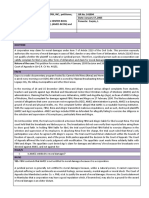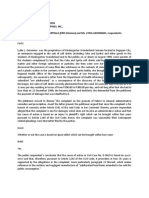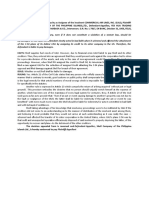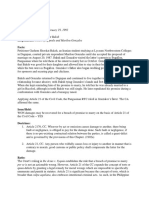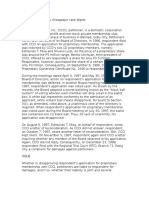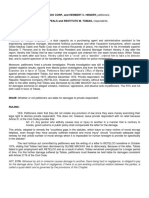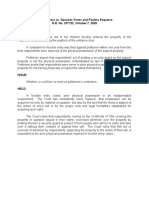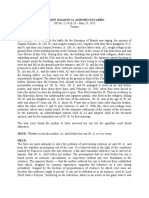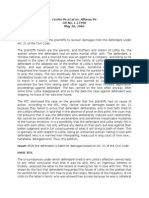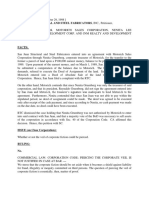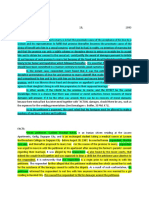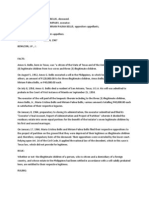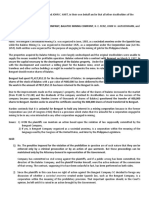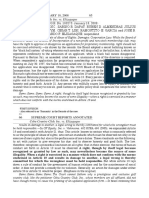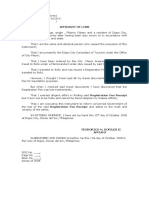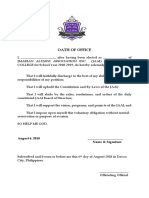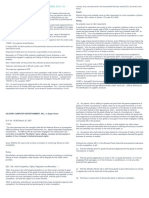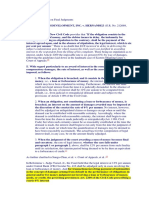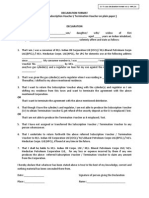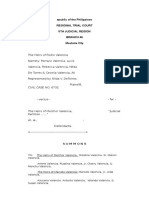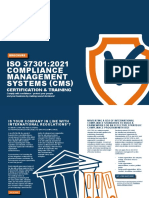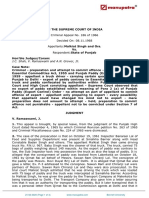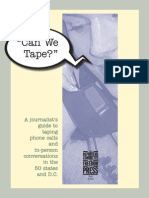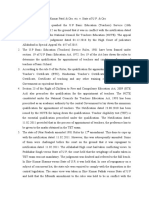Cebu Country Club vs. Elizagaque
Cebu Country Club vs. Elizagaque
Uploaded by
jade123_129Copyright:
Available Formats
Cebu Country Club vs. Elizagaque
Cebu Country Club vs. Elizagaque
Uploaded by
jade123_129Copyright
Available Formats
Share this document
Did you find this document useful?
Is this content inappropriate?
Copyright:
Available Formats
Cebu Country Club vs. Elizagaque
Cebu Country Club vs. Elizagaque
Uploaded by
jade123_129Copyright:
Available Formats
CEBU COUNTRY CLUB, INC. (CCCI) VS ELIZAGAQUE GR 160273 1/182008 TORTS/II-INTENTIONAL TORTS/HUMAN RELATIONS/CATCH ALL PROVISIONS/ABUSE OF RIGHTS ART.
. 19 FACTS CCCI is a domestic corporation operating as a non-profit and non-stock private membership club. (In 1987, San Miguel Corp., a special company proprietary member designated E (for short), its senir vice president and operations manager for Visayas and Mindanao, as a special non-proprietary member.) In 1996, E filed with CCCI an application for proprietary membership, endorsed by 2 members of CCCI. Since it was required for a member to have a proprietary share the price of which was P 5M, the president of CCCI offered respondent a share of only P 3.5M. E however, purchased the share of a certain Dr. Butalid for P 3M. However, his application was deferred. Subsequently, his application was disapproved. Three letters for reconsideration were sent to the BoD, however, no reply was sent by the latter. Hence, E filed with the RTC a complaint for damages. RTC ruled in favor of E. CA affirmed the RTC ruling. Hence, this petition. (It should be mentioned that the By-Laws of the Corporation provided that his eligibility as member required a unanimous vote from the Board of Directors. This provision, however, was not included in the application form. It was further revealed that among the members of the BoD, only one voted his disapproval of the application. This, however, was not made known to E.) ISSUE - Should CCCI be held liable for damages despite the fact that it has the right to choose its members? HELD - Obviously, the CCCI Board of Directors, under its Articles of Incorporation, has the right to approve or disapprove an application for proprietary membership. But such right should not be exercised arbitrarily. Articles 19 and 21 of the Civil Code on the Chapter on Human Relations provide restrictions, thus: Article 19. Every person must, in the exercise of his rights and in the performance of his duties, act with justice, give everyone his due, and observe honesty and good faith. Article 21. Any person who willfully causes loss or injury to another in a manner that is contrary to morals, good customs or public policy shall compensate the latter for the damage. In GF Equity, Inc. v. Valenzona,5 we expounded Article 19 and correlated it with Article 21, thus: This article, known to contain what is commonly referred to as the principle of abuse of rights, sets certain standards which must be observed not only in the exercise of one's rights but also in the performance of one's duties. These standards are the following: to act with justice; to give everyone his due; and to observe honesty and good faith. The law, therefore, recognizes a primordial limitation on all rights; that in their exercise, the norms of human conduct set forth in Article 19 must be observed. A right, though by itself legal because recognized or granted by law as such, may nevertheless become the source of some illegality. When a right is exercised in a manner which does not conform with the norms enshrined in Article 19 and results in damage to another, a legal wrong is thereby committed for which the wrongdoer must be held responsible. But while Article 19 lays down a rule of conduct for the government of human relations and for the maintenance of social order, it does not provide a remedy for its violation. Generally, an action for damages under either Article 20 or Article 21 would be proper. (Emphasis in the original)
In rejecting respondents application for proprietary membership, we find that petitioners violated the rules governing human relations, the basic principles to be observed for the rightful relationship between human beings and for the stability of social order. The trial court and the Court of Appeals aptly held that petitioners committed fraud and evident bad faith in disapproving respondents applications. This is contrary to morals, good custom or public policy. Hence, petitioners are liable for damages pursuant to Article 19 in relation to Article 21 of the same Code. It bears stressing that the amendment to Section 3(c) of CCCIs Amended By-Laws requiring the unanimous vote of the directors present at a special or regular meeting was not printed on the application form respondent filled and submitted to CCCI. What was printed thereon was the original provision of Section 3(c) which was silent on the required number of votes needed for admission of an applicant as a proprietary member. Petitioners explained that the amendment was not printed on the application form due to economic reasons. We find this excuse flimsy and unconvincing. Such amendment, aside from being extremely significant, was introduced way back in 1978 or almost twenty (20) years before respondent filed his application. We cannot fathom why such a prestigious and exclusive golf country club, like the CCCI, whose members are all affluent, did not have enough money to cause the printing of an updated application form. It is thus clear that respondent was left groping in the dark wondering why his application was disapproved. He was not even informed that a unanimous vote of the Board members was required. When he sent a letter for reconsideration and an inquiry whether there was an objection to his application, petitioners apparently ignored him. Certainly, respondent did not deserve this kind of treatment. Having been designated by San Miguel Corporation as a special nonproprietary member of CCCI, he should have been treated by petitioners with courtesy and civility. At the very least, they should have informed him why his application was disapproved. The exercise of a right, though legal by itself, must nonetheless be in accordance with the proper norm. When the right is exercised arbitrarily, unjustly or excessively and results in damage to another, a legal wrong is committed for which the wrongdoer must be held responsible.6 It bears reiterating that the trial court and the Court of Appeals held that petitioners disapproval of respondents application is characterized by bad faith. As to petitioners reliance on the principle of damnum absque injuria or damage without injury, suffice it to state that the same is misplaced. In Amonoy v. Gutierrez,7 we held that this principle does not apply when there is an abuse of a persons right, as in this case.
Cebu Country Club loses court case (Sunstar CEBU)
The Supreme Court upheld the decision of the Court of Appeals ordering the Cebu Country Club, Inc. to pay damages to a businessman whose membership application was rejected. The court said the club acted in bad faith in rejecting the applicant, an officer of San Miguel Corp. Chief Justice Reynato Puno, who wrote the decision of the SC first division, however, modified the decision of the appellate court and reduced the amount of damages awarded to Ricardo Elizagaque. Elizagaque was then senior vice president and operations manager of San Miguel Corp. for Visayas and Mindanao.
In 2003, the CA decided to award Elizagaque P3 million in moral and exemplary damages and P50,000 litigation fees. The SC, in its decision promulgated on Jan.18, reduced the figure to P100,000. Elizagaque sued the Country Clubs board of directors for damages after they disapproved his application for proprietary membership. The case was filed in the Regional Trial Court in Pasig City in December 1998. Elizagaque questioned the disapproval of his application because on Sept. 6, 1996, the CCCI issued him a proprietary ownership certificate after he bought a P3-million share from Dr. Butalid, a club member. The board of directorsSabino Dapat, Ruben Almendras, Julius Neri, Douglas Luym, Cesar Libi, Ramontito Garcia and Jose Salaelevated the issue to the CA after the lower court ordered them to pay the businessman P9 million in damages. On appeal, the SC said the club violated rules governing human relations and had to pay damages. The Supreme Court noted that the Country Club did not inform Elizagaque about its amendment to section 3c of the clubs by-laws which required a unanimous vote of the directors present during a special or regular meeting to qualify for membership. What was printed on Elizagaques application was the original provision of section 3c which was silent on the required number of votes needed for admission of an applicant. The club directors said the amendment was not printed on the form due to financial reasons but the SC found the explanation flimsy and unconvincing. Reporter Nilda Gallo
You might also like
- Sample Petition For AnnulmentDocument2 pagesSample Petition For AnnulmentChanine Mae Cruz0% (2)
- Filipinas Broadcasting Network v. AMECDocument2 pagesFilipinas Broadcasting Network v. AMEChoney samaniego100% (5)
- Arturo C. Calubad, Petitioner. Ricarcen Development Corp., RespondentDocument2 pagesArturo C. Calubad, Petitioner. Ricarcen Development Corp., Respondenthoney samaniego80% (5)
- Coca-Cola Vs CADocument2 pagesCoca-Cola Vs CAjdg jdgNo ratings yet
- D.M. Consunji vs. CA DigestDocument2 pagesD.M. Consunji vs. CA DigestThea Barte86% (7)
- Pe-v.-Pe (Digest)Document2 pagesPe-v.-Pe (Digest)Francis Guinoo100% (1)
- Case Brief Republic Vs IyoyDocument2 pagesCase Brief Republic Vs IyoyJaja Gk100% (3)
- Amonoy vs. GutierrezDocument1 pageAmonoy vs. GutierrezVanya Klarika Nuque100% (1)
- Hermosisima vs. CA DigestDocument1 pageHermosisima vs. CA DigestJudee Anne100% (5)
- Velayo V ShellDocument1 pageVelayo V ShellNathalie Jean Yap100% (3)
- ALBENSON vs. CADocument2 pagesALBENSON vs. CADeus Dulay100% (9)
- Baksh V CA DigestDocument2 pagesBaksh V CA DigestJose Ramon Ampil80% (5)
- CASE DIGEST - Alabang Development Corporation VS Alabang Hills Village AssociationDocument2 pagesCASE DIGEST - Alabang Development Corporation VS Alabang Hills Village AssociationGladys Cañete100% (2)
- Case Title: Saw V CA Citation: G.R. No. 90580 April 8, 1991Document2 pagesCase Title: Saw V CA Citation: G.R. No. 90580 April 8, 1991chrystel100% (2)
- Missionary Sisters of Our Lady of Fatima vs. Alzona DigestDocument4 pagesMissionary Sisters of Our Lady of Fatima vs. Alzona DigestEmir Mendoza100% (4)
- Chain of Custody and Dna EvidenceDocument5 pagesChain of Custody and Dna Evidencejade123_129No ratings yet
- SAMPLE Judicial Affidavit For Estafa and BP 22 1Document7 pagesSAMPLE Judicial Affidavit For Estafa and BP 22 1jade123_129100% (3)
- Important Orders and Rules in CPCDocument3 pagesImportant Orders and Rules in CPCArun .c50% (2)
- SPL DoctrinesDocument31 pagesSPL DoctrinesAw LapuzNo ratings yet
- Defining Public InterestDocument10 pagesDefining Public InterestJamie FerrisNo ratings yet
- Cebu Country Club V Elizagaque Case DigestDocument3 pagesCebu Country Club V Elizagaque Case DigestedrearamirezNo ratings yet
- Cebu Country Club, Inc. vs. ElizagaqueDocument2 pagesCebu Country Club, Inc. vs. ElizagaquejaneNo ratings yet
- Cebu Country Club, Inc. Vs Elizacague (January 18, 2008)Document2 pagesCebu Country Club, Inc. Vs Elizacague (January 18, 2008)Faye Christine May Amacna100% (1)
- Globe Mackay Cable Vs CADocument1 pageGlobe Mackay Cable Vs CARyw100% (1)
- Gashem Shookat Baksh Vs CA (Digest)Document2 pagesGashem Shookat Baksh Vs CA (Digest)MTCD100% (1)
- Garciano Vs CA PFR CaseDocument1 pageGarciano Vs CA PFR CaseNover Keithley MenteNo ratings yet
- Willaware v. Jesichris (IP Law Digest)Document2 pagesWillaware v. Jesichris (IP Law Digest)Francisco Ashley AcedilloNo ratings yet
- RP Vs Javier DigestDocument4 pagesRP Vs Javier DigestErrol TortolaNo ratings yet
- Grace Christian High School Vs CADocument1 pageGrace Christian High School Vs CAIan Jala Calmares50% (2)
- Grace Christian High School Vs Court of AppealsDocument11 pagesGrace Christian High School Vs Court of AppealsAlegria Iris100% (1)
- CIR Vs Primetown DigestDocument1 pageCIR Vs Primetown DigestChanyeol ParkNo ratings yet
- Moreno vs. KhanDocument3 pagesMoreno vs. KhanAnna GuevarraNo ratings yet
- Geluz Vs CA and LazoDocument1 pageGeluz Vs CA and LazoAnne SoriaNo ratings yet
- Eugenio v. VelezDocument2 pagesEugenio v. VelezAnonymous 96BXHnSziNo ratings yet
- Bunag Vs CADocument5 pagesBunag Vs CAryuseiNo ratings yet
- Balinghasay V CastilloDocument1 pageBalinghasay V CastilloMirella100% (3)
- Albenson v. CADocument2 pagesAlbenson v. CAFrancis Xavier Sinon100% (4)
- Domingo Vs MolinaDocument1 pageDomingo Vs MolinaJohn Fredrick BucuNo ratings yet
- People'S Aircargo and Warehousing Co. Inc. vs. Court of Appeals G.R. 117847, 7 OCTOBER 1998 FactsDocument2 pagesPeople'S Aircargo and Warehousing Co. Inc. vs. Court of Appeals G.R. 117847, 7 OCTOBER 1998 FactsRvan GuiNo ratings yet
- Quimiguing v. Icao DigestDocument1 pageQuimiguing v. Icao DigestJef Comendador75% (4)
- Lavadia V Heirs of Luna Case DigestDocument2 pagesLavadia V Heirs of Luna Case DigestAlthea Geronilla100% (2)
- Banate Vs Phil Country SideDocument2 pagesBanate Vs Phil Country SideAnonymous TCXV3yTgqb80% (5)
- Antonio Carag Vs NLRC EtDocument2 pagesAntonio Carag Vs NLRC EtUriel de Guzman100% (2)
- Garcia vs. Sps. EsguerraDocument1 pageGarcia vs. Sps. EsguerraJen-ili TutayNo ratings yet
- Filipinas Port Vs Go - DigestDocument2 pagesFilipinas Port Vs Go - DigestArmand Patiño Alforque100% (2)
- Balogbog v. Court of Appeals (G.R. No. 83598, 7 March 1997)Document9 pagesBalogbog v. Court of Appeals (G.R. No. 83598, 7 March 1997)Romel TorresNo ratings yet
- Government vs. Frank EdDocument1 pageGovernment vs. Frank EdVince Llamazares LupangoNo ratings yet
- Joaquin vs. Navarro (Digest)Document2 pagesJoaquin vs. Navarro (Digest)Tini Guanio50% (2)
- Torts - Pe vs. PeDocument4 pagesTorts - Pe vs. PeCheCheNo ratings yet
- San Juan Structural v. CA - G.R. No. 129459 (Case DIGEST)Document2 pagesSan Juan Structural v. CA - G.R. No. 129459 (Case DIGEST)Jezen Esther Pati75% (4)
- Gashem Shookat Baksh Vs CADocument3 pagesGashem Shookat Baksh Vs CAMitchi Barranco100% (1)
- Custodio V CADocument2 pagesCustodio V CAPatricia Bautista100% (1)
- Terp Construction Corp. v. Banco Filipino SavingsDocument1 pageTerp Construction Corp. v. Banco Filipino SavingsMiguel Bergu100% (2)
- Board of Liquidators V KalawDocument2 pagesBoard of Liquidators V Kalawpretzvinluan100% (3)
- Gashem Shookat Baksh v. Court of Appeals GR No. 97336. February 19, 1993Document3 pagesGashem Shookat Baksh v. Court of Appeals GR No. 97336. February 19, 1993Debroah Faith PajarilloNo ratings yet
- Marc II Marketing, Inc. vs. Alfredo M. JosonDocument1 pageMarc II Marketing, Inc. vs. Alfredo M. JosonDirect LukeNo ratings yet
- Estate of Amos Bellis Case DigestDocument2 pagesEstate of Amos Bellis Case Digesthistab100% (4)
- Harden Vs BenguetDocument2 pagesHarden Vs BenguetTeacherEli100% (1)
- Corpuz Vs Sto. TomasDocument2 pagesCorpuz Vs Sto. TomasRyan MostarNo ratings yet
- Prime White Cement Vs IAC 220 SCRA 103Document3 pagesPrime White Cement Vs IAC 220 SCRA 103Chino Cabrera100% (1)
- Metroheights Subdivision Homeowners Assn. v. CMS ConstructionDocument2 pagesMetroheights Subdivision Homeowners Assn. v. CMS ConstructionLGU CANDIJAY100% (1)
- Hiers of Fe Tan Uy V IBankDocument2 pagesHiers of Fe Tan Uy V IBankKenneth DavidNo ratings yet
- Manuel Dulay Enterprises Vs CA 225 SCRA 678Document3 pagesManuel Dulay Enterprises Vs CA 225 SCRA 678Chino CabreraNo ratings yet
- Caltex vs. Pnoc Shipping and Transport CorporationDocument2 pagesCaltex vs. Pnoc Shipping and Transport CorporationGela Bea BarriosNo ratings yet
- Cebu Country Club, Inc. vs. Elizagaque G.R. No. 160273Document8 pagesCebu Country Club, Inc. vs. Elizagaque G.R. No. 160273Therese ElleNo ratings yet
- Cebu Country Club vs. ElizagaqueDocument13 pagesCebu Country Club vs. ElizagaqueG SNo ratings yet
- ADocument1 pageAjade123_129No ratings yet
- Acknowledgment ReceiptDocument1 pageAcknowledgment Receiptjade123_129No ratings yet
- Affidavit of UndertakingsDocument1 pageAffidavit of Undertakingsjade123_129No ratings yet
- Sole Proprietorship: Corporation Code RegisteredDocument1 pageSole Proprietorship: Corporation Code Registeredjade123_129No ratings yet
- Affidavit of Loss I,, of Legal Age, Single, Filipino Citizen and A Resident of Digos CityDocument1 pageAffidavit of Loss I,, of Legal Age, Single, Filipino Citizen and A Resident of Digos Cityjade123_129No ratings yet
- Documentary Requirements For Franchise ApplicationDocument3 pagesDocumentary Requirements For Franchise Applicationjade123_129No ratings yet
- Programme Alumni 2018Document1 pageProgramme Alumni 2018jade123_129No ratings yet
- Criminal Law 1 June 2018 SyllabusDocument2 pagesCriminal Law 1 June 2018 Syllabusjade123_129No ratings yet
- Jaai Oath of Office Aug 6, 2018Document1 pageJaai Oath of Office Aug 6, 2018jade123_129No ratings yet
- Affidavit of Loss Apple Mae ShiromaDocument1 pageAffidavit of Loss Apple Mae Shiromajade123_129No ratings yet
- Technical Writing 2017Document9 pagesTechnical Writing 2017jade123_129No ratings yet
- For Envelope CoverDocument1 pageFor Envelope Coverjade123_129No ratings yet
- The Secret ExtractDocument11 pagesThe Secret ExtractGulam mustafaNo ratings yet
- Henry G Funda, JR - David Yu Kimteng Vs Atty Walter YoungDocument4 pagesHenry G Funda, JR - David Yu Kimteng Vs Atty Walter Youngjade123_129100% (3)
- Legal Philosophy ReportingDocument1 pageLegal Philosophy Reportingjade123_129No ratings yet
- For Envelope CoverDocument1 pageFor Envelope Coverjade123_129No ratings yet
- Gervacio: (Nora Chang Transcriptions)Document2 pagesGervacio: (Nora Chang Transcriptions)jade123_129No ratings yet
- Canada Large NotepadsDocument3 pagesCanada Large Notepadsjade123_129No ratings yet
- Moa - Social WorkDocument3 pagesMoa - Social Workjade123_129No ratings yet
- Affidavit of Discrepancy in Name OmosoraDocument1 pageAffidavit of Discrepancy in Name Omosorajade123_129No ratings yet
- Certification of Number of Foreign EmployeesDocument1 pageCertification of Number of Foreign Employeesjade123_129No ratings yet
- Certification of Number of Foreign EmployeesDocument1 pageCertification of Number of Foreign Employeesjade123_129No ratings yet
- English 2 AttendanceDocument2 pagesEnglish 2 Attendancejade123_129No ratings yet
- Callanta Criminal Law 1 NotesDocument92 pagesCallanta Criminal Law 1 NotesAna Verne Rea-VelascoNo ratings yet
- Criminal Law Sandoval TipsDocument11 pagesCriminal Law Sandoval Tipsjade123_129No ratings yet
- Lease ContractDocument4 pagesLease Contractjade123_129No ratings yet
- Curriculum Vitae Atty. Lady Jade Q, CanadaDocument2 pagesCurriculum Vitae Atty. Lady Jade Q, Canadajade123_129No ratings yet
- Recentjuris Civil Law FinalDocument86 pagesRecentjuris Civil Law Finaljade123_129No ratings yet
- DBP Vs NLRC, G.R. No. 108031, March 01, 1995Document8 pagesDBP Vs NLRC, G.R. No. 108031, March 01, 1995j0d3No ratings yet
- Personal History: International Organization For MigrationDocument4 pagesPersonal History: International Organization For Migrationnakib sarker100% (1)
- Motion To Move Cootie Browns Lawsuit To Cicruit CourtDocument5 pagesMotion To Move Cootie Browns Lawsuit To Cicruit CourtJessica FullerNo ratings yet
- Offences and Penalties Under GST Act: Tax Law-Ii Assignment OnDocument14 pagesOffences and Penalties Under GST Act: Tax Law-Ii Assignment Onvinay sharmaNo ratings yet
- Burns V HurwitzDocument10 pagesBurns V HurwitzStr8UpNo ratings yet
- Requirements For Increase of Capital StocksDocument3 pagesRequirements For Increase of Capital StocksNarciso Reyes Jr.0% (1)
- #34 SHIRLEY F. TORRES v. IMELDA PEREZ, GR No. 188225, 2012-11-28Document3 pages#34 SHIRLEY F. TORRES v. IMELDA PEREZ, GR No. 188225, 2012-11-28Denise DianeNo ratings yet
- Order 18 Rule 17Document2 pagesOrder 18 Rule 17Maria HerminaNo ratings yet
- Eligibility To Adopt: Adoption Process by Filing Form I-800A. Do Not Accept Any Adoption Placement Before USCIS HasDocument17 pagesEligibility To Adopt: Adoption Process by Filing Form I-800A. Do Not Accept Any Adoption Placement Before USCIS HasNadineNo ratings yet
- Rls-Mpi Rebate Decision Obo-MpiDocument1 pageRls-Mpi Rebate Decision Obo-MpiElishaDaceyNo ratings yet
- 37 - Motion To SealDocument122 pages37 - Motion To SealSarah BursteinNo ratings yet
- Estrada v. Office of The Ombudsman, G.R. Nos. 212761-62, July 31, 2018Document138 pagesEstrada v. Office of The Ombudsman, G.R. Nos. 212761-62, July 31, 2018Jem LicanoNo ratings yet
- Job Description TemplateDocument1 pageJob Description TemplatePraveen NairNo ratings yet
- Interest On Final JudgmentsDocument4 pagesInterest On Final JudgmentsRyan AcostaNo ratings yet
- Declaration Format Loss of SV TVDocument1 pageDeclaration Format Loss of SV TVArivaazhi PeriyaswamyNo ratings yet
- Epublic of The Philippines Regional Trial Court 5Th Judicial Region Branch 46 Masbate CityDocument18 pagesEpublic of The Philippines Regional Trial Court 5Th Judicial Region Branch 46 Masbate CityDiana Sia Villamor100% (1)
- Notes To Taxation I PartIIDocument7 pagesNotes To Taxation I PartIIIsolde212No ratings yet
- ISO 37301:2021 Compliance Management Systems (CMS) : Certification & TrainingDocument9 pagesISO 37301:2021 Compliance Management Systems (CMS) : Certification & TrainingAntónio FerreiraNo ratings yet
- Malkiat Singh and Ors Vs State of Punjab 08111968 s680274COM966960 PDFDocument4 pagesMalkiat Singh and Ors Vs State of Punjab 08111968 s680274COM966960 PDFutkarshNo ratings yet
- CANWETAPEDocument16 pagesCANWETAPEMark ReinhardtNo ratings yet
- Sub-Contract SampleDocument12 pagesSub-Contract SampleRon SantosNo ratings yet
- Ram Kumar PatelDocument3 pagesRam Kumar PatelAbhishekNo ratings yet
- f1c A 100 Acerta Me Agreements v5 1-2018Document7 pagesf1c A 100 Acerta Me Agreements v5 1-2018anon_191750400No ratings yet
- Farmers Bank Limited SWOTDocument3 pagesFarmers Bank Limited SWOTYusuf MahmudNo ratings yet
- T5 B46 Footnote Materials 3 of 3 FDR - 9-13-01 FBI 302 - Nicole Antini-Huffman Aviation Re Atta-Al-Shehhi 148Document3 pagesT5 B46 Footnote Materials 3 of 3 FDR - 9-13-01 FBI 302 - Nicole Antini-Huffman Aviation Re Atta-Al-Shehhi 1489/11 Document Archive100% (2)
- 90 - PEOPLE Vs MUSADocument2 pages90 - PEOPLE Vs MUSALourd CellNo ratings yet

